Gary Gauthier's Blog
December 12, 2018
The Progress of Science and Useful Arts
—What others have thought and expressed ... modified, exalted, improved
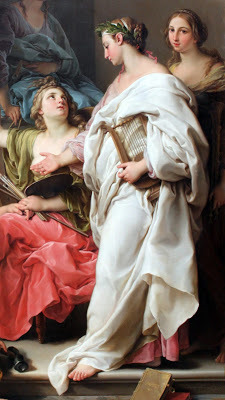 In truth, in literature, in science and in art, there are, and can be, few, if any, things, which in an abstract sense, are strictly new and original throughout. Every book in literature, science and art, borrows, and must necessarily borrow, and use much which was well known and used before.
In truth, in literature, in science and in art, there are, and can be, few, if any, things, which in an abstract sense, are strictly new and original throughout. Every book in literature, science and art, borrows, and must necessarily borrow, and use much which was well known and used before.
No man creates a new language for himself, at least if he be a wise man, in writing a book. He contents himself with the use of language already known and used and understood by others. No man writes exclusively from his own thoughts, unaided and uninstructed by the thoughts of others. The thoughts of every man are, more or less, a combination of what other men have thought and expressed, although they may be modified, exalted, or improved by his own genius or reflection.
Justice Joseph Story, Emerson v. Davies
Painting: Pompeo Girolamo Batoni— Detail from Allegory of the Arts
 In truth, in literature, in science and in art, there are, and can be, few, if any, things, which in an abstract sense, are strictly new and original throughout. Every book in literature, science and art, borrows, and must necessarily borrow, and use much which was well known and used before.
In truth, in literature, in science and in art, there are, and can be, few, if any, things, which in an abstract sense, are strictly new and original throughout. Every book in literature, science and art, borrows, and must necessarily borrow, and use much which was well known and used before.No man creates a new language for himself, at least if he be a wise man, in writing a book. He contents himself with the use of language already known and used and understood by others. No man writes exclusively from his own thoughts, unaided and uninstructed by the thoughts of others. The thoughts of every man are, more or less, a combination of what other men have thought and expressed, although they may be modified, exalted, or improved by his own genius or reflection.
Justice Joseph Story, Emerson v. Davies
Painting: Pompeo Girolamo Batoni— Detail from Allegory of the Arts
Published on December 12, 2018 09:43
July 2, 2017
I wished to get her home at once
— Fortune favored us
When I bent over her I could see that she was still asleep. Her lips were parted, and she was breathing, not softly as usual with her, but in long, heavy gasps, as though striving to get her lungs full at every breath. As I came close, she put up her hand in her sleep and pulled the collar of her nightdress close around her, as though she felt the cold. I flung the warm shawl over her, and drew the edges tight around her neck, for I dreaded lest she should get some deadly chill from the night air, unclad as she was.
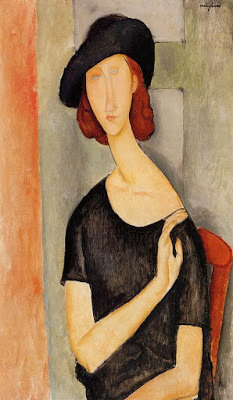 I feared to wake her all at once, so, in order to have my hands free to help her, I fastened the shawl at her throat with a big safety pin. But I must have been clumsy in my anxiety and pinched or pricked her with it, for by-and-by, when her breathing became quieter, she put her hand to her throat again and moaned. When I had her carefully wrapped up I put my shoes on her feet, and then began very gently to wake her.
I feared to wake her all at once, so, in order to have my hands free to help her, I fastened the shawl at her throat with a big safety pin. But I must have been clumsy in my anxiety and pinched or pricked her with it, for by-and-by, when her breathing became quieter, she put her hand to her throat again and moaned. When I had her carefully wrapped up I put my shoes on her feet, and then began very gently to wake her.At first she did not respond, but gradually she became more and more uneasy in her sleep, moaning and sighing occasionally. At last, as time was passing fast, and for many other reasons, I wished to get her home at once. I shook her forcibly, till finally she opened her eyes and awoke. She did not seem surprised to see me, as, of course, she did not realize all at once where she was.
Lucy always wakes prettily, and even at such a time, when her body must have been chilled with cold, and her mind somewhat appalled at waking unclad in a churchyard at night, she did not lose her grace. She trembled a little, and clung to me. When I told her to come at once with me home, she rose without a word, with the obedience of a child. As we passed along, the gravel hurt my feet, and Lucy noticed me wince. She stopped and wanted to insist upon my taking my shoes, but I would not. However, when we got to the pathway outside the churchyard, where there was a puddle of water, remaining from the storm, I daubed my feet with mud, using each foot in turn on the other, so that as we went home, no one, in case we should meet any one, should notice my bare feet.
Fortune favored us, and we got home without meeting a soul.
—Bram Stoker, Dracula
Painting: Amedeo Modigliani, Portrait of Jeanne Hébuterne
Editor's Note: Jeanne Hébuterne was a French artist. She was the frequent subject and common-law wife of Amedeo Modigliani.
Published on July 02, 2017 05:43
August 21, 2016
It was a cheerful, hopeful letter
— Very few letters were written in those hard times that were not touching. In this one little was said of the hardships endured . . . . . . a reminder that hard days need not be wasted.
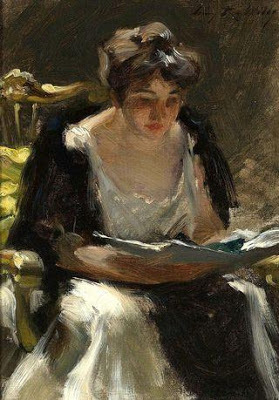 They all drew to the fire, Mother in the big chair with Beth at her feet, Meg and Amy perched on either arm of the chair, and Jo leaning on the back, where no one would see any sign of emotion if the letter should happen to be touching. Very few letters were written in those hard times that were not touching, especially those which fathers sent home. In this one little was said of the hardships endured, the dangers faced, or the homesickness conquered. It was a cheerful, hopeful letter, full of lively descriptions of camp life, marches, and military news, and only at the end did the writer's heart over-flow with fatherly love and longing for the little girls at home.
They all drew to the fire, Mother in the big chair with Beth at her feet, Meg and Amy perched on either arm of the chair, and Jo leaning on the back, where no one would see any sign of emotion if the letter should happen to be touching. Very few letters were written in those hard times that were not touching, especially those which fathers sent home. In this one little was said of the hardships endured, the dangers faced, or the homesickness conquered. It was a cheerful, hopeful letter, full of lively descriptions of camp life, marches, and military news, and only at the end did the writer's heart over-flow with fatherly love and longing for the little girls at home.
"Give them all of my dear love and a kiss. Tell them I think of them by day, pray for them by night, and find my best comfort in their affection at all times. A year seems very long to wait before I see them, but remind them that while we wait we may all work, so that these hard days need not be wasted. I know they will remember all I said to them, that they will be loving children to you, will do their duty faithfully, fight their bosom enemies bravely, and conquer themselves so beautifully that when I come back to them I may be fonder and prouder than ever of my little women."
—Louisa May Alcott, Little Women
Painting: Irving Ramsay Wiles (1861-1948) Woman Reading
 They all drew to the fire, Mother in the big chair with Beth at her feet, Meg and Amy perched on either arm of the chair, and Jo leaning on the back, where no one would see any sign of emotion if the letter should happen to be touching. Very few letters were written in those hard times that were not touching, especially those which fathers sent home. In this one little was said of the hardships endured, the dangers faced, or the homesickness conquered. It was a cheerful, hopeful letter, full of lively descriptions of camp life, marches, and military news, and only at the end did the writer's heart over-flow with fatherly love and longing for the little girls at home.
They all drew to the fire, Mother in the big chair with Beth at her feet, Meg and Amy perched on either arm of the chair, and Jo leaning on the back, where no one would see any sign of emotion if the letter should happen to be touching. Very few letters were written in those hard times that were not touching, especially those which fathers sent home. In this one little was said of the hardships endured, the dangers faced, or the homesickness conquered. It was a cheerful, hopeful letter, full of lively descriptions of camp life, marches, and military news, and only at the end did the writer's heart over-flow with fatherly love and longing for the little girls at home."Give them all of my dear love and a kiss. Tell them I think of them by day, pray for them by night, and find my best comfort in their affection at all times. A year seems very long to wait before I see them, but remind them that while we wait we may all work, so that these hard days need not be wasted. I know they will remember all I said to them, that they will be loving children to you, will do their duty faithfully, fight their bosom enemies bravely, and conquer themselves so beautifully that when I come back to them I may be fonder and prouder than ever of my little women."
—Louisa May Alcott, Little Women
Painting: Irving Ramsay Wiles (1861-1948) Woman Reading
Published on August 21, 2016 09:24
June 20, 2016
Psychological Insights
—The burden of guiltI would have to describe a great many unamorous experiences to explain why I left Hungary again, this time for good—and so soon after offering to die for her. It seems I loved my country as ardently as if she were a woman, and just as inconstantly.
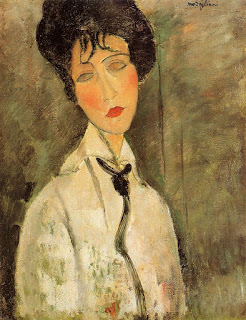 As love is an emotional glimpse of eternity, one can't help half-believing that genuine love will last forever. When it would not, as in my case it never did, I couldn't escape a sense of guilt about my inability to feel true and lasting emotions. This shame was surpassed in intensity only by my doubts as to whether my lover had ever really loved me, when she was the one who ended the affair. In this I'm like most of my skeptical contemporaries: since we no longer reproach ourselves for failing to conform to absolute ethical precepts, we beat ourselves with the stick of psychological insight. When it comes to love, we reject the distinction between moral and immoral for the distinction between "genuine" and "superficial."
As love is an emotional glimpse of eternity, one can't help half-believing that genuine love will last forever. When it would not, as in my case it never did, I couldn't escape a sense of guilt about my inability to feel true and lasting emotions. This shame was surpassed in intensity only by my doubts as to whether my lover had ever really loved me, when she was the one who ended the affair. In this I'm like most of my skeptical contemporaries: since we no longer reproach ourselves for failing to conform to absolute ethical precepts, we beat ourselves with the stick of psychological insight. When it comes to love, we reject the distinction between moral and immoral for the distinction between "genuine" and "superficial."
We're too understanding to condemn our actions; we condemn our motives instead. Having freed ourselves from a code of behavior, we submit to a code of motivation to achieve the sense of shame and anxiety that our elders acquired by less sophisticated means. We rejected their religious morality because it set man against his instincts, weighed him down with a burden of guilt for sins which were in fact the workings of natural laws. Yet we still atone for the creation: we think of ourselves as failures, rather than renounce our belief in the possibility of perfection. We hang onto the hope of eternal love by denying even its temporary validity. It's less painful to think "I'm shallow," "She's self-centered," "We couldn't communicate," "It was all just physical," than to accept the simple fact that love is a passing sensation, for reasons beyond our control and even beyond our personalities. But who can reassure himself with his own rationalizations? No argument can fill the void of a dead feeling—that reminder of the ultimate void, our final inconstancy. We're untrue even to life.
—Stephen Vizinczey, In Praise of Older Women
Painting: Amedeo Modigliani, Portrait of a Woman in a Black Tie
 As love is an emotional glimpse of eternity, one can't help half-believing that genuine love will last forever. When it would not, as in my case it never did, I couldn't escape a sense of guilt about my inability to feel true and lasting emotions. This shame was surpassed in intensity only by my doubts as to whether my lover had ever really loved me, when she was the one who ended the affair. In this I'm like most of my skeptical contemporaries: since we no longer reproach ourselves for failing to conform to absolute ethical precepts, we beat ourselves with the stick of psychological insight. When it comes to love, we reject the distinction between moral and immoral for the distinction between "genuine" and "superficial."
As love is an emotional glimpse of eternity, one can't help half-believing that genuine love will last forever. When it would not, as in my case it never did, I couldn't escape a sense of guilt about my inability to feel true and lasting emotions. This shame was surpassed in intensity only by my doubts as to whether my lover had ever really loved me, when she was the one who ended the affair. In this I'm like most of my skeptical contemporaries: since we no longer reproach ourselves for failing to conform to absolute ethical precepts, we beat ourselves with the stick of psychological insight. When it comes to love, we reject the distinction between moral and immoral for the distinction between "genuine" and "superficial." We're too understanding to condemn our actions; we condemn our motives instead. Having freed ourselves from a code of behavior, we submit to a code of motivation to achieve the sense of shame and anxiety that our elders acquired by less sophisticated means. We rejected their religious morality because it set man against his instincts, weighed him down with a burden of guilt for sins which were in fact the workings of natural laws. Yet we still atone for the creation: we think of ourselves as failures, rather than renounce our belief in the possibility of perfection. We hang onto the hope of eternal love by denying even its temporary validity. It's less painful to think "I'm shallow," "She's self-centered," "We couldn't communicate," "It was all just physical," than to accept the simple fact that love is a passing sensation, for reasons beyond our control and even beyond our personalities. But who can reassure himself with his own rationalizations? No argument can fill the void of a dead feeling—that reminder of the ultimate void, our final inconstancy. We're untrue even to life.
—Stephen Vizinczey, In Praise of Older Women
Painting: Amedeo Modigliani, Portrait of a Woman in a Black Tie
Published on June 20, 2016 07:21
May 9, 2016
A Nation of Their Own
— There were quarrels over flags, disputes about authority and precedence. Grownups joined in, not so much to pacify as to render judgment and enunciate principles.
. . . And this twelve-year-old lad was prominent among the influences that, imperceptibly at first, combined to spoil our holiday and render it unwholesome. Somehow or other, there was a stiffness, a lack of innocent enjoyment. These people stood on their dignity—just why, and in what spirit, it was not easy at first to tell. They displayed much self-respectingness; towards each other and towards the foreigner their bearing was that of a person newly conscious of a sense of honour. And wherefore?
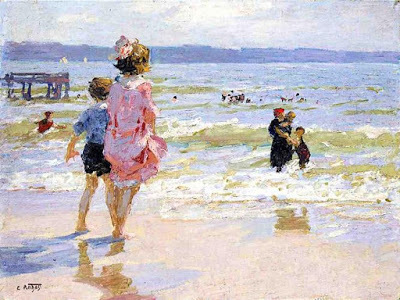
Gradually we realized the political implications and understood that we were in the presence of a national ideal. The beach, in fact, was alive with patriotic children—a phenomenon as unnatural as it was depressing. Children are a human species and a society apart, a nation of their own, so to speak. On the basis of their common form of life, they find each other out with the greatest ease, no matter how different their small vocabularies. Ours soon played with natives and foreigners alike. Yet they were plainly both puzzled and disappointed at times. There were wounded sensibilities, displays of assertiveness—or rather hardly assertiveness, for it was too self-conscious and too didactic to deserve the name. There were quarrels over flags, disputes about authority and precedence. Grownups joined in, not so much to pacify as to render judgment and enunciate principles. Phrases were dropped about the greatness and dignity of Italy, solemn phrases that spoilt the fun. We saw our two little ones retreat, puzzled and hurt, and were put to it to explain the situation. These people, we told them, were just passing through a certain stage, something rather like an illness, perhaps; not very pleasant, but probably unavoidable.
— Thomas Mann, Mario and the Magician
Painting: Edward Henry Potthast, American Impressionist, At the Seashore
. . . And this twelve-year-old lad was prominent among the influences that, imperceptibly at first, combined to spoil our holiday and render it unwholesome. Somehow or other, there was a stiffness, a lack of innocent enjoyment. These people stood on their dignity—just why, and in what spirit, it was not easy at first to tell. They displayed much self-respectingness; towards each other and towards the foreigner their bearing was that of a person newly conscious of a sense of honour. And wherefore?

Gradually we realized the political implications and understood that we were in the presence of a national ideal. The beach, in fact, was alive with patriotic children—a phenomenon as unnatural as it was depressing. Children are a human species and a society apart, a nation of their own, so to speak. On the basis of their common form of life, they find each other out with the greatest ease, no matter how different their small vocabularies. Ours soon played with natives and foreigners alike. Yet they were plainly both puzzled and disappointed at times. There were wounded sensibilities, displays of assertiveness—or rather hardly assertiveness, for it was too self-conscious and too didactic to deserve the name. There were quarrels over flags, disputes about authority and precedence. Grownups joined in, not so much to pacify as to render judgment and enunciate principles. Phrases were dropped about the greatness and dignity of Italy, solemn phrases that spoilt the fun. We saw our two little ones retreat, puzzled and hurt, and were put to it to explain the situation. These people, we told them, were just passing through a certain stage, something rather like an illness, perhaps; not very pleasant, but probably unavoidable.
— Thomas Mann, Mario and the Magician
Painting: Edward Henry Potthast, American Impressionist, At the Seashore
Published on May 09, 2016 07:34
March 18, 2016
On Our Vengeful Errand
— They deemed our ship, a drifting, uninhabited craft, a thing appointed to desolation.
when, after all this silence, his unearthly voice was heard announcing that silvery, moon-lit jet, every reclining mariner started to his feet as if some winged spirit had lighted in the rigging, and hailed the mortal crew. "There she blows!" Had the trump of judgment blown, they could not have quivered more; yet still they felt no terror; rather pleasure. For though it was a most unwonted hour, yet so impressive was the cry, and so deliriously exciting, that almost every soul on board instinctively desired a lowering.
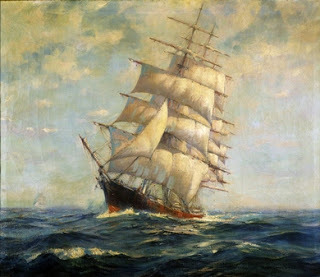 While his one live leg made lively echoes along the deck, every stroke of his dead limb sounded like a coffin-tap. On life and death this old man walked. But though the ship so swiftly sped, and though from every eye, like arrows, the eager glances shot, yet the silvery jet was no more seen that night. Every sailor swore he saw it once, but not a second time.
While his one live leg made lively echoes along the deck, every stroke of his dead limb sounded like a coffin-tap. On life and death this old man walked. But though the ship so swiftly sped, and though from every eye, like arrows, the eager glances shot, yet the silvery jet was no more seen that night. Every sailor swore he saw it once, but not a second time. This midnight-spout had almost grown a forgotten thing, when, some days after, lo! at the same silent hour, it was again announced: again it was descried by all; but upon making sail to overtake it, once more it disappeared as if it had never been. And so it served us night after night, till no one heeded it but to wonder at it. Mysteriously jetted into the clear moonlight, or starlight, as the case might be; disappearing again for one whole day, or two days, or three; and somehow seeming at every distinct repetition to be advancing still further and further in our van, this solitary jet seemed for ever alluring us on.
For a time, there reigned, too, a sense of peculiar dread at this flitting apparition, as if it were treacherously beckoning us on and on, in order that the monster might turn round upon us, and rend us at last in the remotest and most savage seas.
These temporary apprehensions, so vague but so awful, derived a wondrous potency from the contrasting serenity of the weather, in which, beneath all its blue blandness, some thought there lurked a devilish charm, as for days and days we voyaged along, through seas so wearily, lonesomely mild, that all space, in repugnance to our vengeful errand, seemed vacating itself of life before our urn-like prow.
But, at last, when turning to the eastward, the Cape winds began howling around us, and we rose and fell upon the long, troubled seas that are there; when the ivory-tusked Pequod (our ship) sharply bowed to the blast, and gored the dark waves in her madness, till, like showers of silver chips, the foam-flakes flew over her bulwarks; then all this desolate vacuity of life went away, but gave place to sights more dismal than before.
Close to our bows, strange forms in the water darted hither and thither before us; while thick in our rear flew the inscrutable sea-ravens. And every morning, perched on our stays, rows of these birds were seen; and in spite of our hootings, for a long time obstinately clung to the hemp, as though they deemed our ship some drifting, uninhabited craft; a thing appointed to desolation, and therefore a fit roosting-place for their homeless selves. And heaved and heaved, still unrestingly heaved the black sea, as if its vast tides were a conscience; and the great mundane soul were in anguish and remorse for the long sin and suffering it had bred.
— Herman Melville, Moby Dick
Painting, Frank Vining Smith
Published on March 18, 2016 13:18
February 2, 2016
The disease was bubonic plague
No pestilence had ever been so fatal, or so hideous. Blood was its Avatar and its seal—the redness and the horror of blood. . . . The scarlet stains upon the body and especially upon the face of the victim, were the pest ban which shut him out from the aid and from the sympathy of his fellow-men. . . . And the rumor of this new presence having spread itself whisperingly around, there arose at length from the whole company a buzz, or murmur, expressive of disapprobation and surprise—then, finally, of terror, of horror, and of disgust.
And now was acknowledged the presence of the Red Death. He had come like a thief in the night. . . .
IN OCTOBER 1347, two months after the fall of Calais, Genoese trading ships put into the harbor of Messina in Sicily with dead and dying men at the oars. The ships had come from the Black Sea port of Caffa in the Crimea, where the Genoese maintained a trading post. The diseased sailors showed strange black swellings about the size of an egg or an apple in the armpits and groin. The swellings oozed blood and pus and were followed by spreading boils and black blotches on the skin from internal bleeding. The sick suffered severe pain and died quickly within five days of the first symptoms.
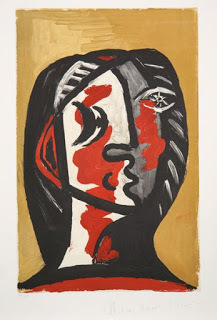 As the disease spread, other symptoms of continuous fever and spitting of blood appeared instead of the swellings or buboes. These victims coughed and sweated heavily and died even more quickly, within three days or less, sometimes in 24 hours. In both types everything that issued from the body—breath, sweat, blood from the buboes and lungs, bloody urine, and blood-blackened excrement—smelled foul. Depression and despair accompanied the physical symptoms, and before the end "death is seen seated on the face."
As the disease spread, other symptoms of continuous fever and spitting of blood appeared instead of the swellings or buboes. These victims coughed and sweated heavily and died even more quickly, within three days or less, sometimes in 24 hours. In both types everything that issued from the body—breath, sweat, blood from the buboes and lungs, bloody urine, and blood-blackened excrement—smelled foul. Depression and despair accompanied the physical symptoms, and before the end "death is seen seated on the face."
The disease was bubonic plague, present in two forms: one that infected the bloodstream, causing the buboes and internal bleeding, and was spread by contact; and a second, more virulent pneumonic type that infected the lungs and was spread by respiratory infection. The presence of both at once caused the high mortality and speed of contagion. So lethal was the disease that cases were known of persons going to bed well and dying before they woke, of doctors catching the illness at a bedside and dying before the patient. So rapidly did it spread from one to another that to a French physician, Simon de Covino, it seemed as if one sick person "could infect the whole world." The malignity of the pestilence appeared more terrible because its victims knew no prevention and no remedy.
The physical suffering of the disease and its aspect of evil mystery were expressed in a strange Welsh lament which saw "death coming into our midst like black smoke, a plague which cuts off the young, a rootless phantom which has no mercy for fair countenance."
Woe is me . . .
And Darkness and Decay and the Red Death held illimitable dominion over all.
—Barbara W. Tuchman, A Distant Mirror
Painting: Pablo Picasso, Head of a Woman
And now was acknowledged the presence of the Red Death. He had come like a thief in the night. . . .
IN OCTOBER 1347, two months after the fall of Calais, Genoese trading ships put into the harbor of Messina in Sicily with dead and dying men at the oars. The ships had come from the Black Sea port of Caffa in the Crimea, where the Genoese maintained a trading post. The diseased sailors showed strange black swellings about the size of an egg or an apple in the armpits and groin. The swellings oozed blood and pus and were followed by spreading boils and black blotches on the skin from internal bleeding. The sick suffered severe pain and died quickly within five days of the first symptoms.
 As the disease spread, other symptoms of continuous fever and spitting of blood appeared instead of the swellings or buboes. These victims coughed and sweated heavily and died even more quickly, within three days or less, sometimes in 24 hours. In both types everything that issued from the body—breath, sweat, blood from the buboes and lungs, bloody urine, and blood-blackened excrement—smelled foul. Depression and despair accompanied the physical symptoms, and before the end "death is seen seated on the face."
As the disease spread, other symptoms of continuous fever and spitting of blood appeared instead of the swellings or buboes. These victims coughed and sweated heavily and died even more quickly, within three days or less, sometimes in 24 hours. In both types everything that issued from the body—breath, sweat, blood from the buboes and lungs, bloody urine, and blood-blackened excrement—smelled foul. Depression and despair accompanied the physical symptoms, and before the end "death is seen seated on the face." The disease was bubonic plague, present in two forms: one that infected the bloodstream, causing the buboes and internal bleeding, and was spread by contact; and a second, more virulent pneumonic type that infected the lungs and was spread by respiratory infection. The presence of both at once caused the high mortality and speed of contagion. So lethal was the disease that cases were known of persons going to bed well and dying before they woke, of doctors catching the illness at a bedside and dying before the patient. So rapidly did it spread from one to another that to a French physician, Simon de Covino, it seemed as if one sick person "could infect the whole world." The malignity of the pestilence appeared more terrible because its victims knew no prevention and no remedy.
The physical suffering of the disease and its aspect of evil mystery were expressed in a strange Welsh lament which saw "death coming into our midst like black smoke, a plague which cuts off the young, a rootless phantom which has no mercy for fair countenance."
Woe is me . . .
And Darkness and Decay and the Red Death held illimitable dominion over all.
—Barbara W. Tuchman, A Distant Mirror
Painting: Pablo Picasso, Head of a Woman
Published on February 02, 2016 14:07
September 3, 2015
Things you learn at school
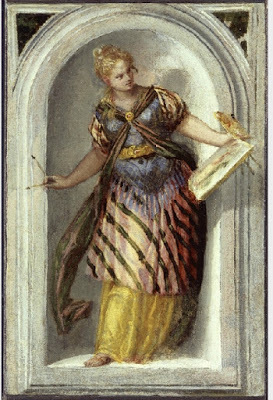
—Arts and Habits
At school you are engaged not so much in acquiring knowledge as in making mental efforts under criticism. A certain amount of knowledge you can indeed with average faculties acquire so as to retain; nor need you regret the hours you spent on much that is forgotten, for the shadow of lost knowledge at least protects you from many illusions. But you go to school not so much for knowledge as for arts and habits; for the habit of attention, for the art of expression, for the art of assuming at a moment's notice a new intellectual position, for the art of entering quickly into another person's thoughts, for the habit of submitting to censure and refutation, for the art of indicating assent or dissent in graduated terms, for the habit of regarding minute points of accuracy, for the art of working out what is possible in a given time, for taste, for discrimination, for mental courage, and for mental soberness. Above all, you go to school for self-knowledge.
—William Johnson Cory
Painting: Paolo Veronese, The Muse of Painting
Published on September 03, 2015 15:22
May 24, 2015
Don't cut my throat, sir
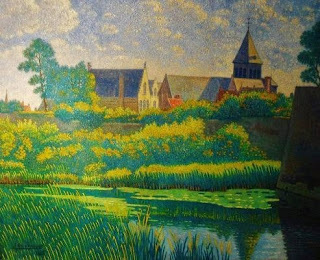
Hold your noise! cried a terrible voice, as a man started up from among the graves at the side of the church porch. "Keep still, you little devil, or I'll cut your throat!"
A fearful man, all in coarse gray, with a great iron on his leg. A man with no hat, and with broken shoes, and with an old rag tied round his head. A man who had been soaked in water, and smothered in mud, and lamed by stones, and cut by flints, and stung by nettles, and torn by briars; who limped, and shivered, and glared, and growled; and whose teeth chattered in his head as he seized me by the chin.
"Oh! Don't cut my throat, sir," I pleaded in terror.
—Charles Dickens, Great Expectations
Painting: Jozef Quisthoudt, Belgian (1883-1953); St.Peter's church in Ypres; Naïve style
Naïve art is a classification of art that is often characterized by a childlike simplicity in its subject matter and technique; and the artist appears to have little or no formal training. Above, the middle paragraph is loaded with images but lacks a complete sentence.
Published on May 24, 2015 08:24
May 19, 2015
How a natural law is contained
—the will and convenience of society
 If nature has made any one thing less susceptible than all others of exclusive property, it is the action of the thinking power called an idea, which an individual may exclusively possess as long as he keeps it to himself; but the moment it is divulged, it forces itself into the possession of every one, and the receiver cannot dispossess himself of it. Its peculiar character, too, is that no one possesses the less, because every other possesses the whole of it.
If nature has made any one thing less susceptible than all others of exclusive property, it is the action of the thinking power called an idea, which an individual may exclusively possess as long as he keeps it to himself; but the moment it is divulged, it forces itself into the possession of every one, and the receiver cannot dispossess himself of it. Its peculiar character, too, is that no one possesses the less, because every other possesses the whole of it.
He who receives an idea from me, receives instruction himself without lessening mine; as he who lights his taper at mine, receives light without darkening me. That ideas should freely spread from one to another over the globe, for the moral and mutual instruction of man, and improvement of his condition, seems to have been peculiarly and benevolently designed by nature, when she made them, like fire, expansible over all space, without lessening their density in any point, and like the air in which we breathe, move, and have our physical being, incapable of confinement or exclusive appropriation. Inventions then cannot, in nature, be a subject of property.
Society may give an exclusive right to the profits arising from them, as an encouragement to men to pursue ideas which may produce utility, but this may or may not be done, according to the will and convenience of the society, without claim or complaint from anybody.
—Thomas Jefferson, Writings
Sketch: Leonardo da Vinci
 If nature has made any one thing less susceptible than all others of exclusive property, it is the action of the thinking power called an idea, which an individual may exclusively possess as long as he keeps it to himself; but the moment it is divulged, it forces itself into the possession of every one, and the receiver cannot dispossess himself of it. Its peculiar character, too, is that no one possesses the less, because every other possesses the whole of it.
If nature has made any one thing less susceptible than all others of exclusive property, it is the action of the thinking power called an idea, which an individual may exclusively possess as long as he keeps it to himself; but the moment it is divulged, it forces itself into the possession of every one, and the receiver cannot dispossess himself of it. Its peculiar character, too, is that no one possesses the less, because every other possesses the whole of it. He who receives an idea from me, receives instruction himself without lessening mine; as he who lights his taper at mine, receives light without darkening me. That ideas should freely spread from one to another over the globe, for the moral and mutual instruction of man, and improvement of his condition, seems to have been peculiarly and benevolently designed by nature, when she made them, like fire, expansible over all space, without lessening their density in any point, and like the air in which we breathe, move, and have our physical being, incapable of confinement or exclusive appropriation. Inventions then cannot, in nature, be a subject of property.
Society may give an exclusive right to the profits arising from them, as an encouragement to men to pursue ideas which may produce utility, but this may or may not be done, according to the will and convenience of the society, without claim or complaint from anybody.
—Thomas Jefferson, Writings
Sketch: Leonardo da Vinci
Published on May 19, 2015 14:12



